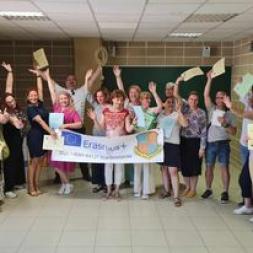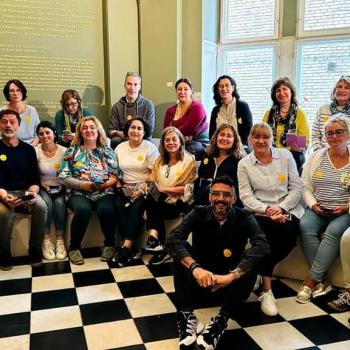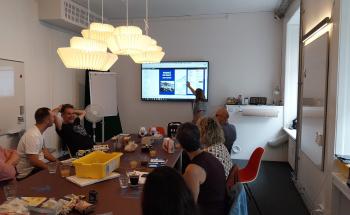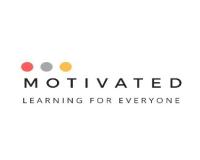
“21st century Education and Teaching Skills: Equip the Next Generations with Digital Competence”
The purpose of this KA1 Erasmus+ Course is to create the foundation for ongoing dialogue around how 21st century knowledge and skills can be appropriately embedded in educator preparation, and to guide the development of resources, services and digital competence to support educator programs.
Description
Module 1:
Welcome and registration. Getting to know each other: Ice breaking activities; Introduction of the course members; Presentation of schools.
Talking about the schedule of the course; Identification of the needs and goals for each participant; Introduction: FRAMEWORK FOR 21ST CENTURY EDUCATION: Going from 4Cs to 7Cs;Digital Tools for the Classroom: Padlet, Google Classroom, Kahoot, Edmodo, Zoom, Teams, Jigsaw planet, Quizzes and online tests, Video creation platforms, Liberating structures, miro, mural, storytelling dice and other tools;
Module 2:
Characteristics of Effective 21st century Teaching/Teachers: ICT in education - Digital Tools for Effective Classroom Communication; Teaching and Training - ways to maximize learning potential using technology -Key terminology of the digital classroom; Workshop: Canva, Socrative and Class Dojo
Teacher and Google-21. Who is the better 21st century educator? (Critical discussion);
Module 3:
Outdoor activity with a training task: “Treasure Hunt”/ combined with Sightseeing Activity (Digital tools: Goosechase, Actionbound);
Module 4:
Characteristics of Effective 21st century Teaching/Teachers; Critical Thinking and Problem Solving; Creativity and Innovation; Cooperative learning, Gamification. In the interactive Classroom: Using Questions and Feedback to Generate a Discussion; Introduction to Moodle; Advantages of the Digital Classroom; Introduction to Weebly: Creating a web page in Weebly; The difference between traditional approach and 21st century classes;
Module 5:
Group work: 21st century Learning Skills: AI in education. Applying the 7Cs in the classroom through AI platforms; How will AI influence the 21st century classroom? How to make AI a collaborator instead of obstacle? ChatGPT, GPT4, Midjourney, Sora; Feedback, evaluation; Delivery of Certificates.
IMPORTANT: PARTICIPANTS COULD ATTEND 5, 6, 7 OR MORE DAYS IN ACCORDANCE TO THEIR APPLICATION.
Learning objectives
The course objectives are: Engaging teachers in creating instruction aligned with their state’s curriculum standards, effectively interpreting assessment results, responding to students’ learning needs, and cultivating a passion for learning that will support students for a lifetime; Meeting the demands of the global economy by exemplifying, and embedding in instruction, the mastery of 21st century skills such as critical thinking, problem-solving, communication, collaboration and creativity and innovation; Application of technology to support more robust instructional methods; Better understanding the relationship between content, pedagogy and technology; Aligning instruction with standards, particularly those standards that embody 21st century knowledge and skills; Balancing direct instruction strategically with project-oriented teaching methods; Using a range of strategies to reach diverse students and to create environments that support differentiated teaching and learning; Provide knowledge and skills with a positive attitude towards innovations, feel the necessity for self-education, and adopt a student-centered and project-based teaching approaches; Develop teaching professional skills, trying to be "an effective model of competence"; Learning to learn competence; Integrate 21st century skills and content in instruction;Technology skills, knowing when and how to use current educational technology, as well as the most appropriate type and level of technology to maximize student learning; Using a variety of research-verified approaches to improve teaching and learning; Developing a set of thinking, reasoning, teamwork, investigative, and creative skills that students can use in all areas of their lives through incorporating different subjects across an existing curriculum; Using an invigorating teaching approach to old content; Developing habits of mind that can last a lifetime and guide learning and creative thinking; Pursuing continuous learning opportunities
Methodology & assessment
Certification details
At the end of the course, each participant will be awarded a Certificate of Attendance along with Europass Mobility.
Our certificates are in line with the Erasmus Quality Standards and so include the course's title, short description of its learning outcomes (if requested), dates, venue, the name of the course provider and the course director, number of training hours.
We support participants in every step of certification and validation of learning outcomes with specific focus on European instruments and Erasmus+ requirements such as Learning Agreement, Quality Commitment and Europass mobility.
Pricing, packages and other information
-
Price:560Euro
Additional information
-
Language:English
-
Target audience ISCED:Primary education (ISCED 1)Lower secondary education (ISCED 2)Upper secondary education (ISCED 3)
-
Target audience type:TeacherHead Teacher / PrincipalICT Coordinator
-
Learning time:25 hours or more
Upcoming sessions
Past sessions
More courses by this organiser

“Inclusive Education in the Classroom: Using Drama for Students with Special Needs”

“21st Innovation Center for Teachers: Project-Based and Student-Centered Learning”


